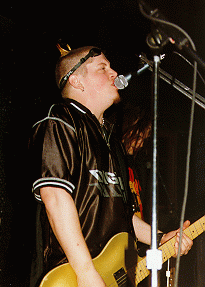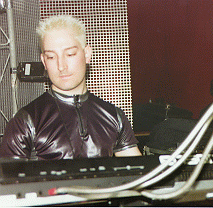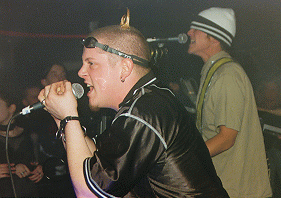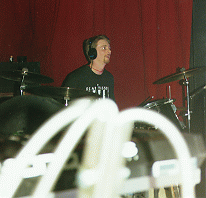

Jester: So are you excited to be on tour again?
Eric: Yes. Every tour seems to get better. I seem to weed out people and start over with almost a new band on every tour.
Jester: Will the three days of practice be enough?
Eric: I wouldn't really call them days, more like hours, or even minutes.
Jester: So who is in the live line-up this time?
Eric: The live line-up always changes because we don't really have a drummer or keyboard player in the band. This time John Irish from Area 88 is playing keyboards and Steve Watkins from Scar Tissue is playing drums. Also Mark Peoples from Skrew is playing bass, and Krayge Taylor from Virus 23 is on guitar.
Jester: What exactly happened with Marc LaCorte leaving the band?
Eric: Why is that even an issue?
Jester: Well, I had heard rumors that you and Marc had a falling out, and I wasn't sure what was truth or what was rumor.
Eric: Part of that is true. I do think that Marc is really
talented and that he is a good guitar player but his ethics are not the same as
mine. Not that is is a bad thing, but he wants to be a huge rock star, and that
isn't the direction that I want the band to go.

Jester: Are you going to be looking for another record label to release your next album with?
Eric: Yes. Actually there are a lot of labels looking at us right now. For once, instead of having to seek out a label, there are a lot of people actually trying to recruit us this time around. Apparently the tour we did last year built up quite a hype in the industry. Definitely something will happen with a new label and it will probably happen very soon.
Jester: I noticed you have been busy working on a number of cover compilations like "Newer Wave", "CyberPulp Fiction", and "TeeVee Toons". What would you consider your favorite cover song you have done?
Eric: 'Girl, You'll Be a Woman Soon', by Neil Diamond for "CyberPulp Fiction". That particular song has a very different approach than our other cover material. It has a lot of cheesy little keyboard parts and we really tried to keep the song very thin and simple.
Jester: I know you have been keeping busy with production work. You produced recent "3D House of Beef", and "Dandy Warhols" albums. How is that different from working on your own material?
Eric: The big difference is that I am responsible for the sound on the final product. It is a different role than anything I've done before. Instead of being told by the mixer that my music sounds like crap, I am the one telling the band that. Most of it is throwing out ideas, tips, and tricks that I have learned in the past to the band I am working with. The whole point of working with really different bands was to also open up my mind to explore new musical possibilities as well.
Jester: You also appeared on the Remix Wars releases. How did you get asked to remixed Hate Dept on Strike III?
Eric: Since I've been friends with Siebold for such a long time, Don at 21st Circuitry just called me up and asked me if I'd like to participate.
Jester: How has the response been for that release?
Eric: For the most part it has been favorable. The
interesting thing is some people like us and don't like Hate Dept, or vice
versa. So now that we have remixed each other's material, we have really thrown
most of our fans a major conundrum.

Jester: Has the Pillow project that you were supposed to be doing with Daniel Vahnke of Vampire Rodents been put on hold?
Eric: Yes. In fact, it has been on hold for little over a year now. Personally, I am ready to work on it as soon as Daniel is ready. Most of the music is complete but we just need money to finish recording the vocals and the final unfinished tracks. As soon as Re-Constriction give me some money to finish the album, I'll do it.
Jester: Is Re-Constriction financing a portion of this tour?
Eric: Yes, despite the fact that they are not contractually obligated to do so.
Jester: Have you been getting a good response from the release of the new album now that Re-Constriction has a better distributor?
Eric: Yes. We just broke 10,000 units, which means we are only about $123 from paying off the advance on the album. The first 10,000 is always the hardest to get and once you finally get it, usually everything is cool afterwards. I am so used to being in debt after releasing an album that it is finally nice to almost break even.
Jester: Will Hellbent ever tour? Or is it just a studio project?
Eric: There has been a rumor that Hellbent is going to be signed to Wax Trax. I don't know if that will happen, but we won't release another album on Fifth Column Records simply because they are treading too close to bankruptcy for comfort.
The whole point of the project was for fun anyways. We wanted to be able to work with each other but not participate in each others bands, so Hellbent was the perfect outlet. It gave us a chance to work with other people who we might not normally get a chance to work with.
We wanted to make the material a very simple, disco-type sound that was very easy to dance to. The whole point of the project is supposed to be cheesy and it is meant to be a joke. Hopefully no one has taken it seriously.
Jester: What do you feel about the current state of
'Industrial' music today?

Eric: I think that in order for the 'Industrial' genre to continue, people have to stop listening to old Skinny Puppy records. It is not 1987 anymore, it is 1997. People have to accept change. There is too much internal turmoil occurring for it to continue. The bands who continue to evolve and change are simply not going to remain in this genre and it is going to piss everyone off who refused to accept that kind of change.
The whole concept of this genre was to remain open minded musically. People didn't care if you used guitars, or how you modified your vocals. The whole goal was to make something different and so few people can accept that fact these days.
Jester: Do you like to be associated with the 'Industrial' genre?
Eric: I think if 16 Volt would have started right now, I don't think we would have been included in this genre of music. However, because we started so may years ago, our roots remain in this genre and nothing we can do will ever change that. "Wisdom" was definitely an 'Industrial' type album so we are perpetually stuck in this scene. However, I like all types of music. I have absolutely no bias in music. I don't care who they are, what instruments they play, or what type of music they choose to make.
Jester: Who are you listening to currently?
Eric: Poe, Korn, Helmet, White Zombie, and I still love Meat Beat Manifesto. I will love that band forever and will turn my kids onto it.
Jester: Do you feel that the Portland music scene is finally about to break?
Eric: Possibly. The bands are definitely present, it just all depends on if they are good and if they can begin to draw a regular audience.
Jester: Has it become easier to book a show in Portland?
Eric: Yes. Suburbia opened and they are not choosy about
who they book. The whole key is that you have to have an all ages club to play
here in Portland. The over age crowd simply doesn't care about the scene and
you'll just end up playing to 50% drunk people who are there simply because the
club has something on tap. Clubs are giving more bands a chance to be heard
simply because there are more clubs available to play at now. If the press
could just step in and pay attention to the scene then perhaps things will
begin to become positive.

Jester: Is there any truth to the rumor that you sampled a few Skinny Puppy sounds and used them while recording "Wisdom"?
Eric: No. That is a twisted rumor. Actually I took kick drums samples from Lead into Gold. Fluffy asked me where I got the samples from, I told them that they were from his record, and he went and got the twenty-four track tapes and we sampled directly from them instead. He also gave me a DAT full of raw sounds that he has used in the past but I've never actually used any of them myself.
Jester: Have you ever had any type of musical training?
Eric: I took guitar lessons when I was a kid. I stopped taking them when I realized that I suck. My mother took the remainder of my lessons because she paid for several months in advance. So now my mother is a pretty good guitar player. Then later I went back and took more a few years later. Other than that, I took saxophone lessons for awhile. However, the reed in the saxophone drove me crazy. To this day, I hate popsicle sticks, pencils, and any wood reeded instrument.
Jester: How did just a finite amount of musical training evolve into a band?
Eric: I grew up always listening to music. My dad used to be a song writer and now he works at a record label. My mother is a classically trained pianist. There was always music being played in my home so it was just natural for me to be involved with music. As I got older I realized that I could make a living from it, so forming a band became the obvious choice.
Jester: But you can't quite live off your music yet.
Eric: True. Right now I am in a state of financial hop-scotch. One moment I have a lot of money and the next moment I am broke.
Jester: Didn't you used to spend time between touring doing remix and production work for Chase at Re-Constriction?
Eric: Yes. I could have done it this time when I was home, but I choose to get a part time job so that I could make more money. So I was actually doing production work, working part time, and coding web sites on the side while I was home. I have gone totally blue collar.
Jester: So what is the deal with the pig tails? Every time you go on tour you get a different hair style.
Eric: Last time I tried to dye my hair violet and it ended up pink. So I ended up dying it black. I also grew dreads for awhile but they were too high maintenance for me. So I've gone for a very simple hair style on this tour. As for the pig tails, just wait for the live show and you'll understand.